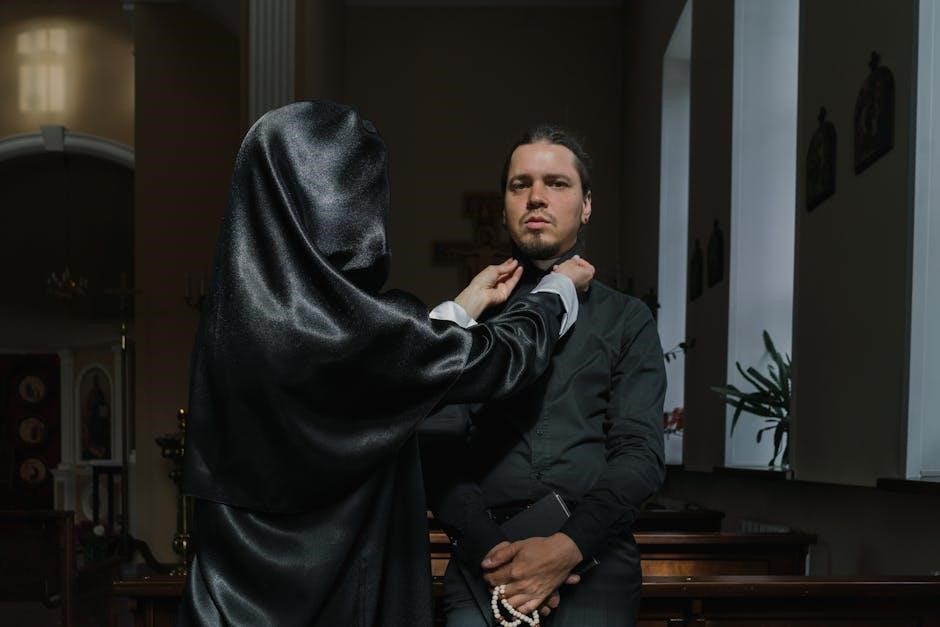Church elders are spiritual leaders entrusted with guiding the congregation, ensuring doctrinal purity, and overseeing worship. They work alongside ministers to shepherd the flock, preach, and administer sacraments, fulfilling their divine calling to lead and serve.
1.1. Definition and Overview of Church Elders
Church elders are spiritual leaders appointed to guide and oversee the local congregation. They are entrusted with responsibilities such as preaching, teaching, and administering sacraments, ensuring doctrinal purity. Elders provide oversight, shepherd the flock, and lead in prayer and intercession. Working collaboratively with ministers and other leaders, they are responsible for the spiritual well-being of the church family. Their role is rooted in biblical teachings, emphasizing their authority and responsibility to serve and lead. Elders are essential for maintaining order, unity, and spiritual growth within the church, fulfilling their divine calling to care for God’s people.
1.2. Historical Context of Elders in the Church
The role of church elders is deeply rooted in biblical and historical traditions. In the New Testament, elders were appointed to oversee local churches, providing spiritual guidance and oversight. The early church adopted this model from Jewish synagogue leadership, where elders served as respected community leaders. Historically, elders have been responsible for maintaining doctrinal integrity, resolving disputes, and shepherding the congregation. Their role has evolved over centuries, but the core responsibilities of spiritual leadership, teaching, and care for the flock have remained consistent. This historical foundation emphasizes the significance of elders as key figures in the life and governance of the church.
1.3. Importance of Elders in Modern Churches
In modern churches, elders play a vital role in maintaining spiritual and doctrinal integrity. They provide leadership, guidance, and oversight, ensuring the church remains aligned with biblical teachings. Elders are essential for resolving conflicts, offering counsel, and fostering unity among members. Their role in preaching, teaching, and shepherding helps nurture spiritual growth within the congregation. Additionally, elders are instrumental in strategic planning and decision-making, ensuring the church adapts to contemporary challenges while staying true to its mission. Their influence extends beyond the church, contributing to community transformation and spiritual renewal, making their leadership indispensable in today’s evolving religious landscape.

Biblical Basis for the Role of Elders
The role of elders is rooted in Scripture, with Old Testament elders serving as leaders and New Testament elders shepherding the church, guided by Christ.
2.1. Old Testament Roots of Eldership
In the Old Testament, elders served as community leaders, chosen for their wisdom and integrity. They played roles in governance, dispute resolution, and spiritual guidance, setting the stage for the New Testament model of church leadership.
2.2. New Testament Teachings on Elders
The New Testament emphasizes elders as overseers and shepherds, guiding the church with integrity and wisdom. They are tasked with teaching, prayer, and governing, as seen in Acts and the Epistles, ensuring the church remains faithful to Christ’s teachings.
2;3. Key Scriptures Governing Elders’ Duties
Scriptures like Acts 20:28 and Titus 1:9 outline elders’ roles in overseeing the church and teaching sound doctrine. 1 Peter 5:1-4 emphasizes shepherding the flock with humility and integrity, while Hebrews 13:17 calls elders to lead with faithfulness. These passages establish biblical authority for their responsibilities in spiritual guidance, prayer, and church governance, ensuring elders serve as godly examples to the congregation.
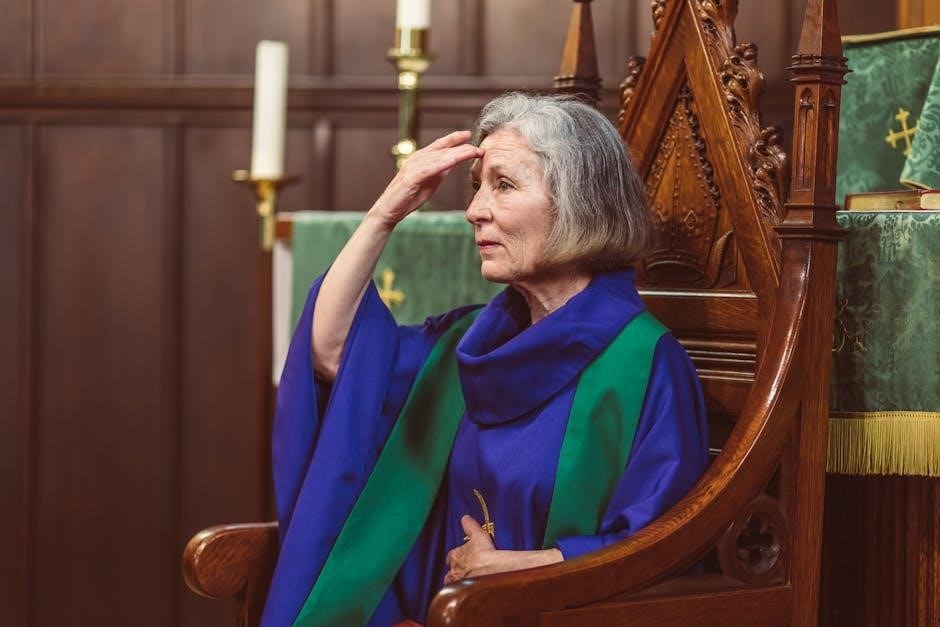
Key Responsibilities of Church Elders
Elders provide spiritual oversight, ensure doctrinal purity, lead in prayer, preach the Word, administer sacraments, and offer community leadership, guiding the church with wisdom and integrity.
3;1. Spiritual Oversight and Shepherding
Elders are called to provide spiritual oversight, acting as shepherds who nurture and guide the congregation. This involves teaching, praying, and caring for members’ spiritual well-being. They ensure the flock remains faithful to God’s Word, addressing spiritual needs and fostering a deeper relationship with Christ. Elders also offer guidance in times of doubt or conflict, helping believers grow in maturity and holiness. Their role is both protective and nurturing, ensuring the church remains united and focused on its mission. This shepherding ministry is vital for the spiritual health and growth of the church family.
3.2. Ensuring Doctrinal Purity
Elders are responsible for safeguarding the church’s teachings, ensuring alignment with biblical truths. They must vigilantly guard against false doctrines and promote sound theology. By teaching and preaching the Word accurately, elders help the congregation understand and apply God’s truths. This involves reviewing educational materials, guiding theological discussions, and addressing any deviations from scriptural principles. Their role is to maintain the integrity of the church’s beliefs, ensuring that all practices and teachings reflect the Bible’s authority. This commitment to doctrinal purity protects the church from error and fosters a community grounded in faith and biblical integrity.
3.3. Leading in Prayer and Intercession
Elders are called to lead the church in prayer and intercession, fostering a culture of dependence on God. They pray for the congregation’s spiritual growth, guidance, and protection. Elders also intercede for the sick, afflicted, and those in need, demonstrating compassion and care. By modeling a life of prayer, they encourage the church to seek God’s will in all matters. Leading prayer meetings and corporate worship, elders ensure that prayer remains central to the church’s life. Their role in intercession strengthens the church’s spiritual foundation and deepens its relationship with Christ.
3;4. Preaching and Teaching the Word
Elders are responsible for preaching and teaching the Word of God, ensuring the congregation receives sound biblical instruction. They deliver sermons, lead Bible studies, and provide spiritual guidance, helping members grow in faith and understanding. Elders must be men of God’s Word, able to teach doctrine clearly and apply it practically. Their role includes equipping believers for ministry and helping them navigate life’s challenges through scripture. By faithfully proclaiming the gospel, elders fulfill their calling to feed the flock and strengthen the church in truth and wisdom.
3.5. Administering Sacraments
Elders are entrusted with the sacred duty of administering sacraments, such as communion and baptism, which are central to the church’s worship and spiritual life. They ensure these rites are conducted with reverence and in accordance with biblical teachings. By leading these sacred ceremonies, elders provide spiritual nourishment and strengthen the congregation’s connection to Christ. Their role in administering sacraments underscores their responsibility to uphold the church’s traditions and foster a deeper understanding of God’s grace among believers. This duty reflects their commitment to preserving the integrity of worship and guiding the flock in meaningful spiritual practices.
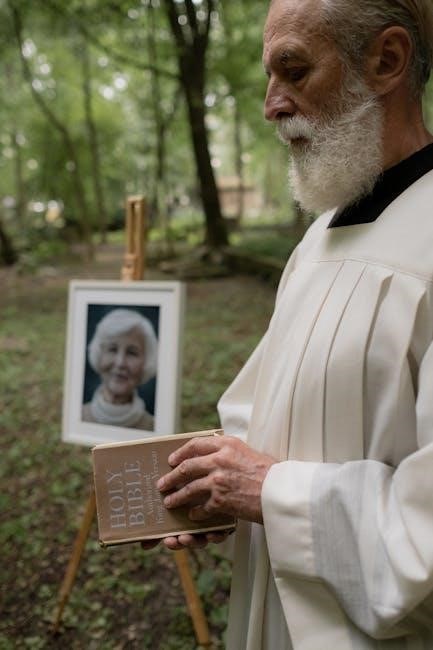
3.6. Providing Community Leadership
Elders play a pivotal role in providing community leadership by guiding the congregation with wisdom and integrity. They inspire and support the flock, fostering a sense of unity and purpose. By leading by example, elders encourage believers to live out their faith authentically. They also address conflicts and challenges within the church, promoting harmony and spiritual growth. Their leadership extends beyond spiritual matters, as they often oversee community initiatives and outreach programs. Through their dedication, elders help the church remain a beacon of hope and love, empowering members to serve both God and their neighbors effectively.
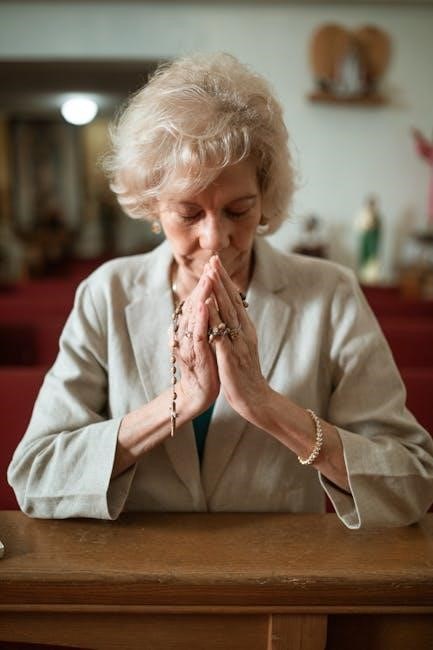
Qualifications and Characteristics of Elders
Elders must be godly, wise, and of integrity, demonstrating a deep love for Christ and His people. They are called to lead with humility and compassion, ensuring their lives reflect biblical standards and a commitment to serving others.
4.1. Scriptural Qualifications for Elders
Elders must meet specific scriptural qualifications, including being blameless, the husband of one wife, temperate, sober-minded, and hospitable (Titus 1:6-9, 1 Timothy 3:2-7). They should be above reproach, with a good reputation, and demonstrate a deep understanding of Scripture. Elders are called to be examples of godliness, maintaining integrity in their personal and public lives. They must be able to teach sound doctrine and refute false teachings, ensuring the church remains faithful to God’s Word. These qualifications ensure elders are spiritually mature and capable of shepherding the flock effectively, upholding the standards set by Scripture for leadership in the church.
4.2. Personal Characteristics of Effective Elders
Effective elders are marked by a servant-hearted attitude, demonstrating humility, compassion, and a genuine love for the congregation. They possess strong communication skills, being approachable and empathetic. Elders should exhibit wisdom, discernment, and a commitment to prayer, fostering a culture of spiritual growth. Their lives should reflect integrity, transparency, and a blameless reputation, inspiring trust and respect. They must be teachable, open to feedback, and willing to lead by example. These personal qualities, combined with a deep passion for God’s Word, enable elders to shepherd the church effectively, fostering unity and spiritual maturity among believers.
4.3. The Role of Integrity in Eldership
Integrity is the cornerstone of effective eldership, serving as the foundation for trust and credibility. Elders must consistently demonstrate moral uprightness, transparency, and honesty in their actions and decisions. A lack of integrity undermines their authority and the congregation’s confidence. By living out biblical principles, elders model Christ-like character, fostering a culture of accountability and trust within the church. Their commitment to integrity ensures they remain above reproach, both in their personal lives and in their leadership roles.
The Relationship Between Elders and Deacons
Elders focus on spiritual oversight, deacons on service, collaborating to ensure effective church governance and harmonious ministry, each supporting the other in their distinct roles.
5.1. Understanding the Offices of Elder and Deacon
The offices of elder and deacon are distinct roles within the church, each serving unique purposes. Elders are primarily responsible for spiritual oversight, including preaching, teaching, and shepherding the congregation. They ensure doctrinal purity and provide guidance. Deacons, on the other hand, focus on practical service, addressing the physical and emotional needs of the church body. While elders concentrate on spiritual leadership, deacons support the elders by managing logistical and organizational tasks. This division of labor ensures a balanced approach to church governance, with elders handling spiritual matters and deacons attending to practical needs, working together for the church’s overall well-being.
5.2. Collaborative Roles in Church Governance
Elders and deacons collaborate to ensure effective church governance, with elders focusing on spiritual leadership and deacons on practical service. This partnership allows elders to concentrate on preaching, teaching, and doctrinal oversight while deacons manage logistical and organizational tasks. Their joint efforts create a balanced approach, ensuring both spiritual and practical needs are met. This teamwork supports the overall mission of the church, fostering a cohesive and well-organized community of believers. By working together, they exemplify a unified body serving under Christ’s leadership.
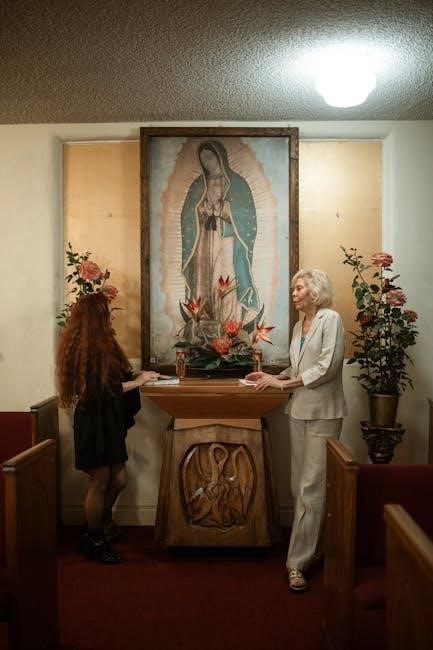
5.3. Distinctions in Responsibilities
Elders primarily focus on spiritual leadership, including preaching, teaching, and ensuring doctrinal purity, while deacons manage practical aspects like church operations and community service. Elders shepherd the congregation and oversee spiritual matters, whereas deacons support the elders by addressing physical and logistical needs. This division allows elders to concentrate on their spiritual duties without being burdened by administrative tasks. Deacons, in turn, enable the elders to fulfill their call to shepherd and teach effectively. Together, they form a complementary team, ensuring both spiritual and practical needs are met within the church, reflecting a balanced and organized approach to church governance.
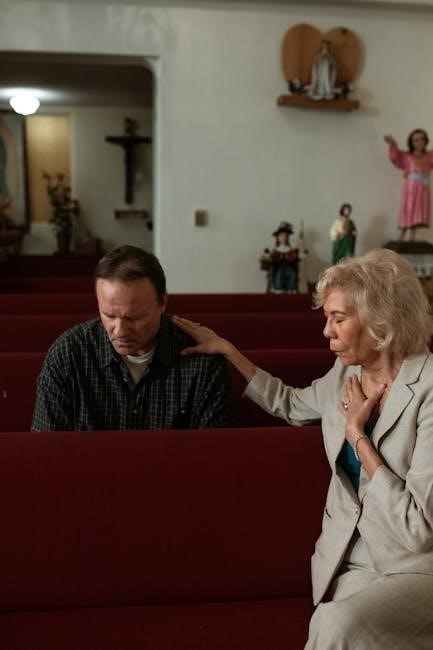
Training and Development for Church Elders
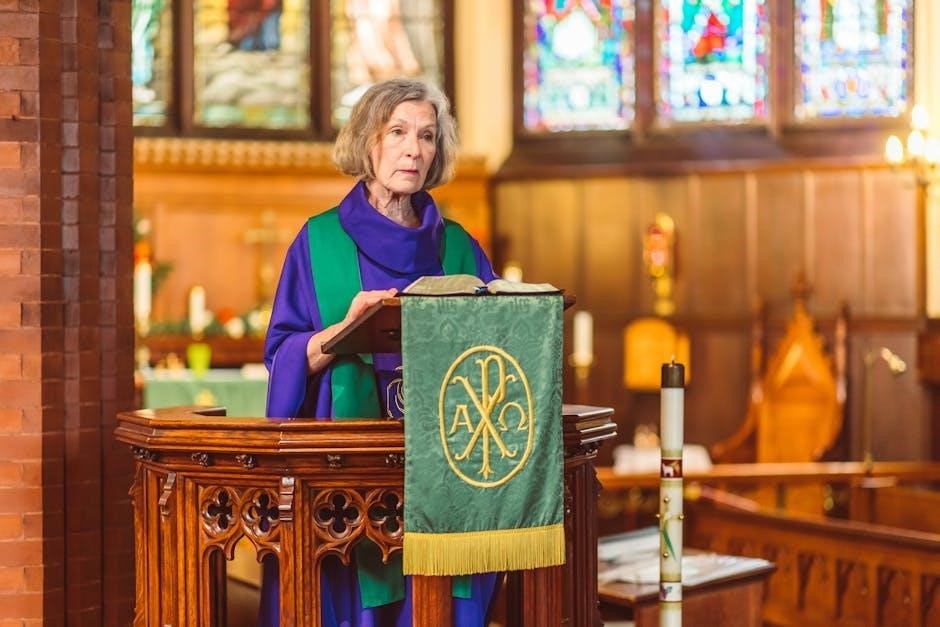
Elders receive biblical and practical training to fulfill their roles effectively, focusing on spiritual oversight, doctrine, and service, ensuring they are well-equipped for their responsibilities.
6.1; Biblical Training for Elders
Elders undergo comprehensive biblical training to deeply understand Scripture and its application. This includes studying the Old and New Testaments, focusing on passages that outline their roles and responsibilities. They learn to interpret and teach God’s Word accurately, ensuring doctrinal purity. The training emphasizes the importance of prayer, shepherding, and leadership. Elders are also taught to model their lives after biblical standards, fostering integrity and accountability. This foundation equips them to guide the congregation effectively and make decisions aligned with God’s will.
6.2. Practical Skills Development
Elders receive training in practical skills to effectively fulfill their roles. This includes improving public speaking, leadership, and conflict resolution abilities. They learn to navigate church governance, manage budgets, and engage with the community. Practical skills development also involves understanding how to counsel members, mediate disputes, and organize church events. Elders are taught to collaborate with other leaders, such as deacons, to ensure seamless church operations. These skills are essential for addressing real-world challenges and fostering a cohesive, thriving congregation. By refining these abilities, elders become well-rounded leaders capable of meeting the spiritual and practical needs of their church family.
6.3. The Importance of Mentorship
Mentorship is vital for developing effective church elders. Experienced leaders guide new elders, helping them understand their duties and navigate challenges. This relationship fosters personal growth, equips them with practical wisdom, and ensures the continuation of strong leadership. Mentors provide invaluable insights, share experiences, and offer support, enabling elders to lead with confidence and integrity. Through mentorship, elders gain a deeper understanding of their role in shepherding the congregation and maintaining doctrinal purity. This developmental process strengthens the church by preparing elders to address modern issues while remaining faithful to biblical principles, ensuring a legacy of godly leadership for future generations.
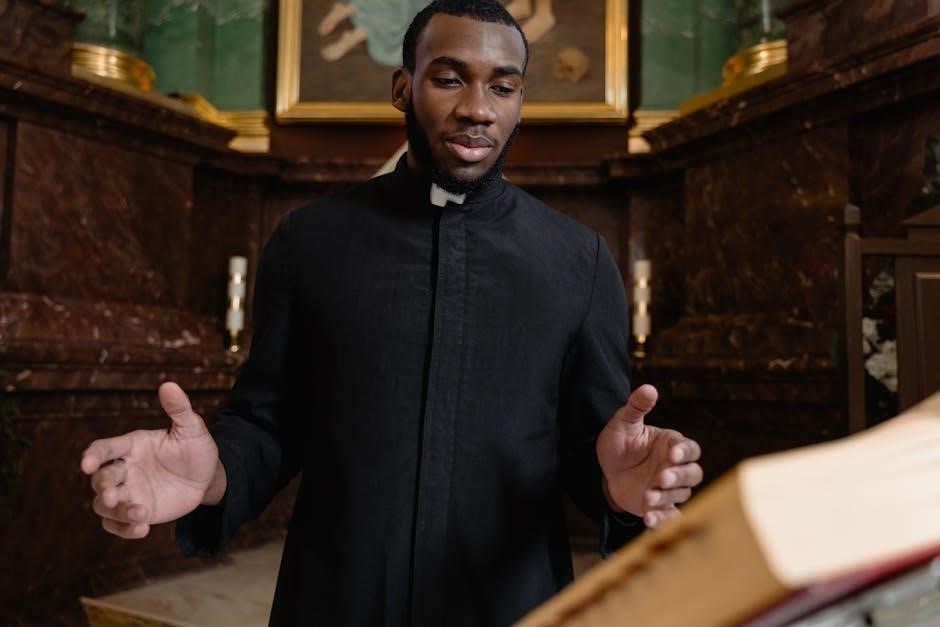
Accountability and Discipline Among Elders
Elders must uphold high standards of integrity, with accountability structures ensuring their conduct aligns with biblical principles. Discipline is addressed lovingly to maintain trust and unity.
7.1. Accountability Structures for Elders
Elders are held to high biblical standards, requiring transparent lives and humility. Churches establish accountability structures, such as peer reviews and congregational oversight, to ensure elders maintain integrity. Regular assessments and open communication help uphold their duties, fostering trust and unity within the church body. Accountability ensures elders lead by example, aligning their actions with scriptural teachings and church values.
7.2. Handling Discipline Within Eldership
Discipline among elders is addressed through biblical principles, ensuring integrity and accountability. Churches often follow a structured process, starting with private confrontation and escalating to broader oversight if necessary. Biblically guided procedures, such as those outlined in Matthew 18, emphasize restoration while maintaining the dignity of the eldership. Confidentiality and fairness are prioritized to protect both the individual and the church body. The goal is to correct and restore, fostering a culture of humility and transparency, which strengthens trust within the congregation and upholds the church’s spiritual standards.
7.3. Maintaining Unity and Trust
Maintaining unity and trust within the eldership is crucial for effective church leadership. Elders must model Christ-like behavior, fostering an environment of open communication and mutual respect. Regular meetings and biblical conflict resolution help prevent divisions. Transparency in decision-making and accountability structures build trust among the congregation. By prioritizing spiritual harmony, elders ensure the church remains a beacon of unity, reflecting God’s love and purpose. A united eldership strengthens the church’s witness and fosters a culture of trust, essential for spiritual growth and community impact.
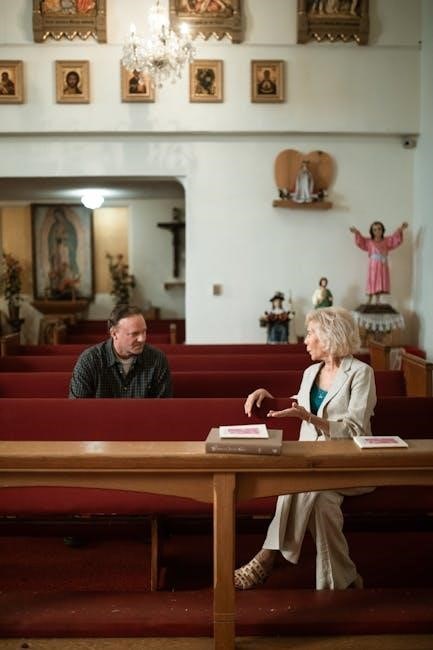
The Impact of Effective Eldership
Effective eldership fosters a vibrant church community, promoting spiritual growth, unity, and strong leadership, which enhances the church’s ability to transform lives and impact society meaningfully.
8.1. Spiritual Growth in the Congregation
Elders play a pivotal role in fostering spiritual growth within the church. By providing biblical guidance, oversight, and teaching, they help members deepen their faith and mature in Christ. Their prayers, sermons, and personal encouragement inspire believers to walk closely with God, leading to transformed lives. Effective eldership cultivates a culture of discipleship, where individuals grow in their understanding of Scripture and their relationship with Jesus. This spiritual nurturing equips the congregation to live out their faith authentically, creating a vibrant, mature, and unified church body that reflects God’s love and purposes in the world.
8.2. Strong Church Leadership
Elders provide strong leadership by setting a spiritual tone and vision for the church. They ensure the congregation remains aligned with biblical teachings and values. Elders model integrity, wisdom, and a deep understanding of Scripture, which fosters trust and confidence among members. By leading in prayer, preaching, and decision-making, they guide the church toward unity and purpose. Their leadership creates a stable foundation, enabling the church to thrive and fulfill its mission. Effective eldership ensures that the church remains focused on its calling, equipping believers to live faithfully and serve effectively in their communities.
8.3. Community Transformation
Elders play a pivotal role in fostering community transformation by modeling Christ-like behavior and encouraging believers to live out their faith. Through their leadership, churches are empowered to address social issues, promote unity, and serve the needs of the surrounding area. Elders help create an environment where the gospel is not only preached but also demonstrated through compassionate outreach. Their guidance enables the church to become a beacon of hope, influencing the community positively. By equipping members to live missionally, elders ensure the church’s impact extends beyond its walls, driving meaningful change and reflecting God’s love in tangible ways.
Practical Steps for Churches
Churches can identify and develop future elders through biblical training, mentorship, and practical experience, ensuring a strong foundation for effective leadership and spiritual growth.
9.1. Identifying and Developing Future Elders
Identifying future elders involves recognizing individuals with strong spiritual character, leadership potential, and a heart for service. Churches should implement structured mentorship programs, providing biblical training and practical experience. Encouraging participation in ministry tasks and fostering a deeper understanding of doctrinal principles helps cultivate effective leaders. Regular evaluation and guidance from existing elders ensure candidates are well-prepared for the responsibilities of eldership. This intentional development process not only strengthens the church’s leadership but also ensures continuity in spiritual oversight and shepherding. By investing in potential leaders, churches can build a strong foundation for future generations.
9.2. Implementing Effective Eldership Models
Effective eldership models require clear role definitions, collaborative leadership, and a focus on spiritual accountability. Churches should establish structured training programs to equip elders with biblical knowledge and practical skills. Encouraging open communication and teamwork among elders fosters unity and shared responsibility. Regular evaluations and feedback mechanisms ensure elders remain aligned with the church’s mission. By implementing these models, churches can create a leadership framework that promotes spiritual growth, maintains doctrinal integrity, and serves the congregation effectively. This approach ensures eldership remains a vital and dynamic component of church governance, empowering leaders to fulfill their duties with wisdom and compassion.
9.3. Encouraging Elder Involvement
Encouraging elder involvement is crucial for the health and effectiveness of church leadership. Churches should foster an environment where elders feel valued and empowered to contribute their gifts and experiences. Providing opportunities for mentorship, leadership development, and spiritual growth helps elders stay engaged and motivated. Recognizing their service and offering support for their personal and familial well-being can also enhance their involvement. By creating a culture of collaboration and appreciation, churches can ensure that elders remain active and committed to their roles, ultimately benefiting the congregation and advancing the church’s mission. This involvement strengthens the church’s foundation and fosters unity among leaders.
